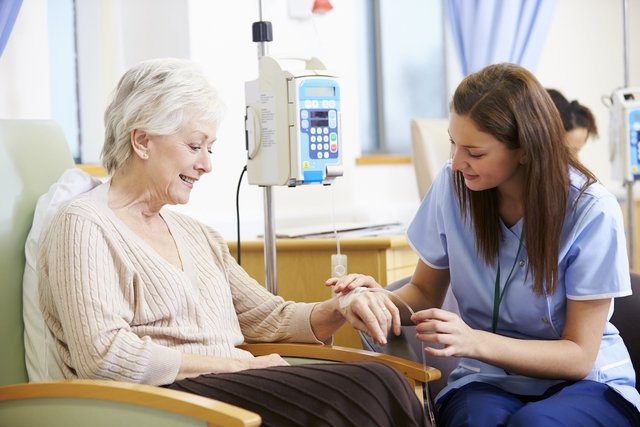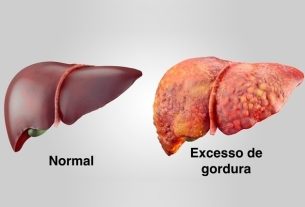Cyclophosphamide is a chemotherapy drug indicated for the treatment of various types of tumors, such as breast cancer, ovarian cancer, lung cancer, leukemia or lymphoma, and can also be used for the treatment of autoimmune diseases, such as lupus nephritis, for example, due to its immunosuppressive action that decreases the action of the immune system.
This medicine is generally used in hospitals, applied directly into the vein by a nurse, under medical supervision, and is called Genuxal. Furthermore, it can be found in pharmacies or drugstores in the form of 50 mg tablets, sold upon presentation of a medical prescription.
Cyclophosphamide should only be used with the advice of an oncologist, hematologist or rheumatologist, with individualized doses, calculated by the doctor according to the body surface and disease to be treated.

What is it for
Cyclophosphamide is indicated for the treatment of:
- Breast or ovarian cancer;
- Small cell lung cancer;
- Myeloid, lymphoblastic or lymphocytic leukemia;
- Hodgkin’s lymphoma and non-Hodgkin’s lymphoma;
- Anemia aplasia grave;
- Multiple Myeloma;
- Neuroblastomas;
- Plasmacitoma;
- Retinoblastoma.
Cyclophosphamide works by preventing the multiplication of cancer cells, and is generally associated with other chemotherapy drugs, which vary according to the type of cancer to be treated and the stage of the disease.
Furthermore, due to its immunosuppressive action, cyclophosphamide can be used to treat autoimmune diseases, such as rheumatoid arthritis, lupus nephritis, Wegener’s granulomatosis or organ transplant rejection.
Which doctor to consult?
The doctor responsible for treating cancer is the oncologist, who must guide the doses of cyclophosphamide, as well as monitor the emergence of side effects.
Taking care of your health has never been easier!
How to use
How cyclophosphamide is used varies according to its presentation and includes:
1. Injectable cyclophosphamide
Injectable cyclophosphamide must be used through injections directly into the vein, applied by a nurse, in the hospital or in specialized clinics, under the supervision of the oncologist.
The dosage of injectable cyclophosphamide varies according to the person’s body surface, calculated by the doctor according to the person’s weight and height, as well as the disease to be treated and standardized treatment protocols.
Cyclophosphamide should be applied slowly, generally over 30 minutes to 2 hours, to reduce the risk of side effects during administration.
2. Cyclophosphamide 50 mg tablet
Cyclophosphamide tablets should be taken orally, with a glass of water, without breaking or chewing the tablet, preferably in the morning, before a meal. However, your doctor may recommend taking it after a light meal to avoid feeling sick.
The doses of cyclophosphamide in tablet form must be calculated by the doctor, according to the type of disease to be treated and the person’s body surface.
During treatment with cyclophosphamide tablets, it is recommended to increase water intake to stimulate the production and elimination of urine, to avoid intoxication in the urinary tract and the emergence of hemorrhagic cystitis. Therefore, it is recommended to drink at least 100 mL of water every hour.
Additionally, during treatment with cyclophosphamide, your doctor may recommend taking mesna tablets, which help protect the urinary tract, generally taken 2 hours before cyclophosphamide, and 2 and 6 hours after the cyclophosphamide dose. Mesna doses must be advised by the doctor on an individual basis and in accordance with the recommended dose of cyclophosphamide.
If you forget to take a dose, you should take it as soon as you remember. However, if it is almost time to take the next dose, skip the missed dose and take the next one, continuing the dose schedule recommended by your doctor as normal. In this case, you should not take double the medication to make up for the missed dose.
Missing a dose of cyclophosphamide tablets may compromise the effectiveness of the treatment.
Possible side effects
The most common side effects that may occur during treatment with cyclophosphamide are:
- Nausea and vomiting;
- Diarrhea;
- Hair loss;
- Loss of appetite;
- Irregular menstrual cycle;
- Urinary infections;
- Tearing during injection.
Additionally, cyclophosphamide can lower blood cell levels and increase the risk of infections. Therefore, you should immediately notify your doctor if symptoms such as mouth ulcers, fever, chills, pain or burning when urinating, bloody urine or stools, bleeding, pale skin, dizziness or shortness of breath, for example, appear.
Care during treatment
Some precautions are important during treatment with cyclophosphamide, such as:
- Taking cyclophosphamide tablets correctlyas indicated by the doctor;
- Take blood tests regularly as ordered by your doctorsuch as the blood count, to evaluate blood cells;
- Do not increase or decrease the dose of cyclophosphamide without having been advised by a doctor;
- Do not stop treatment on your ownwithout medical advice;
- Increase water intake during treatment to avoid hemorrhagic cystitis;
- Avoid taking teas or natural remedies during treatmentas they may interfere with the action of cyclophosphamide;
- Avoid drinking grapefruit juice or grapefruit during treatmentas it may reduce the effectiveness of cyclophosphamide;
- Avoid taking medication on your own and without medical recommendation, as they may interfere with the treatment;
- Avoid contact with people who have the flucolds or other types of infection;
- Avoid touching surfaces and putting your hands over your eyes, mouth or nose;
- Wash your hands frequentlywith water and neutral soap, especially before and after going to the bathroom, eating, cooking, touching animals, gardening or changing the child’s diaper, for example;
- Take vaccines only if recommended by your doctoras some vaccines with active or attenuated viruses are contraindicated during treatment;
- Avoid staying indoors or with many people and little air circulation for a long time, such as shopping malls or gyms
- Use safe contraceptive methods and condoms during treatment with cyclophosphamide and for at least 1 year after treatment, in the case of women, as cyclophosphamide can cause harm to the fetus;
- Use a barrier contraceptive method for menduring treatment and for at least 4 months after the last dose;
- Store cyclophosphamide tablets in the original packagingtaking only the pills you are going to take from the pack;
- Store cyclophosphamide tablets in the refrigerator, at temperatures between 2º to 8ºC, and away from children. It is advisable not to store it in the refrigerator door, as constantly opening and closing the door can cause temperature variations in the cyclophosphamide. Do not put the tablets in the freezer.
Cyclophosphamide can cause infertility, which can sometimes be permanent, so it is recommended to discuss the possibility of preserving eggs or sperm with your doctor before starting treatment.
Who shouldn’t use
Cyclophosphamide should not be used by pregnant or breastfeeding women, or by people who have active infections, urinary tract infections, such as cystitis, urinary tract obstruction, or severe bone marrow involvement.
Furthermore, cyclophosphamide should not be taken by people who are allergic to cyclophosphamide or any other component of the formula.

Sign up for our newsletter and stay up to date with exclusive news
that can transform your routine!
Warning: Undefined array key "title" in /home/storelat/public_html/wp-content/plugins/link-whisper-premium/templates/frontend/related-posts.php on line 12
Warning: Undefined array key "title_tag" in /home/storelat/public_html/wp-content/plugins/link-whisper-premium/templates/frontend/related-posts.php on line 13



